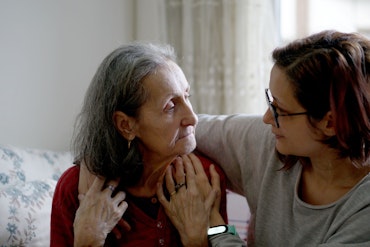Changing face of aged care nutrition
Well known chef, Maggie Beer, has thrown her support behind new research being undertaken at Bond University by PhD student, Cherie Hugo, which aims to change the face of aged care nutrition in Australia.

Bond PhD student, Cherie Hugo, speaks at the Bond University event last week about her new research into aged care nutrition, with well known chef, Maggie Beer, pictured in the background.
Ms Beer joined Ms Hugo, for an intimate lunch at Queensland's Bond University last week to shine a light on the issue, with research revealing one in two aged care residents are undernourished.
Ms Hugo, a dietician and columnist, is undertaking a three year PhD research program at Bond University, as part of The Lantern Project, which is researching the state of aged care nutrition with a view to influencing government policy and initiating change.
The project has been backed by Ms Beer’s The Maggie Beer Foundation, launched in April this year with a similar goal. The Foundation includes a heavyweight board of executives from aged care, academia and commerce, including Bond University's Head of Nutrition and Dietetics, Professor Liz Isenring.
Ms Hugo told guests at the lunch that her passion for The Lantern Project had evolved over more than 15 years of working with the elderly and a desire to see food become a part of the day they looked forward to.
“It should be a highlight of their day and, at the moment, it is not always,” she says. Ms Hugo adds the problems leading to malnutrition in aged care facilities were complex and required expertise and input from a range of key stakeholders.
“It is all about collaborating and getting people from different areas to come together and I’m already working with an exciting group of people, including Maggie and Liz,” she says.
“As malnutrition increases, the quality of life decreases and the driver behind this project is a commitment to see residents continuing to enjoy a fantastic quality of life.”
Ms Hugo’s project is being rolled out in three phases – the first focusing on exploring the issue in further depth, the second on the issues of dental care and nourishment, and the third putting a dollar value on nutrition in aged care facilities.
“Quantifying the value of nutrition is the major portion of our study. If we don’t put a value on this issue, we won’t have government on our side to help us make a change,” she says.
“It is a complex problem that goes beyond the food itself. If someone is undernourished, they are more likely to be depressed, have falls, pressure areas and not recover from wounds or infection, so the ultimate goal is improving quality of life.
“From a systems point of view, it is looking at trying to improve satisfaction and what we really want to achieve is talking to government about changing its policy.
“We’ve already had meetings with government and they’re considering this issue, so we are confident we are already starting to achieve change.
“We want The Lantern Project, which is currently focused on Queensland and New South Wales, to become a national project and we’re working with an exciting bunch of people to see that happen.”
Ms Beer is championing The Lantern Project as she spearheads change through her own foundation – The Maggie Beer Foundation.
She says improving the nutrition of aged care residents wasn’t just about improving health, but their overall wellbeing.
“No one needs the pleasure you get from food more than the elderly, who can’t ‘do’ for themselves,” Ms Beer says.
“Aged care facilities are homes for their residents and they need things to look forward to. There is nothing more instantly gratifying than a beautiful meal served in lovely surroundings.
“It needs to smell good, taste good and be nutritious and there are so many things revolving around that.”
According to Ms Beer, achieving ‘a good food life’ for all was a cornerstone of her foundation.
“The change beautiful food can make to wellbeing is amazing. This is much more complicated than a restaurant or cafe, we need higher standards that are very specific to aged care because as we age we need different types of nutrition – every mouthful is important. Every mouthful should be something that gives pleasure and nutrition,” she says.
“Its important to know that there are many places doing this well and its important we find these and celebrate them and use them as benchmarks.
“There is such change we can help bring about and with the energy that is coming from so many people working collaboratively on this issue, I have no doubt we’ll achieve this.”























